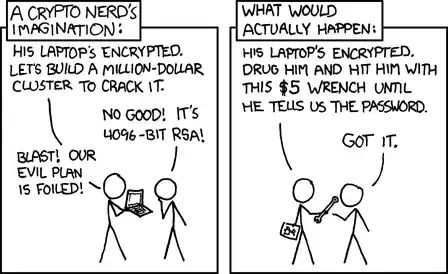Some common terms for this is "rubber hose cryptography" or sometimes "monkey wrench cryptography". I have also heard it being refered to as "the one side channel to rule them all", but that is hardly an established name.
What this boils down to is the realisation that in the end all security relies on physical security. If the place where you store the key is not secure, the data protected by the key is not secure. If the place where you store your key is your memory (or your back pocket), what we are talking about here is your physical security.
There is no silver bullet for this one. A clever trick like hidden volumes is not useless, but I can imagine that a violent, determined, and competent attacker would make you talk about them.
You can split the key or store the parts on different locations. Or you can leverage an existing institution by putting the key in a safe deposit (that requires you to show ID) at a bank. Both of these are very unpractical if you need the key for daily use, and both can of course be broken. In fact, the last one might even just escalate the situation when the attacker is forced to take more drastic actions to compulse you to get the key from the bank.
Others solutions include setting up a dead man's switch (where the data is automatically deleted unless you check in each day) or having a fake key that when used deletes the data. These could prevent the attacker from getting to the data, but obviously at the cost of the data being deleted.
And would you really like to deal with the guy with the monkey wrench after he finds out you duped him? If you are worried about a violent attacker, you need to have a hard think about wheater the integrity of your data is really more important to you than your knee caps or your life. In a lot of cases, the best solution is to give up and give the guy with the monkey wrench what he wants. After that, you can call the police. Unless the attacker is the police, of course...
So why doesn't the bad guys always attack with a rubber hose instead of with Metasploit? Using violence is expensive:
- The victim will know that you attacked, and stole the data.
- You need physical proximity to the victim, and the attack can not be automated.
- A lot of people think you can still go to heaven even if you abuse SQLi vulnerabilities, but waterboarding will land you in hell.
- It is risky. What if the victim fights back? What if you get caught? I have never heard of anyone getting shot while doing packet injection.
- The police is way more likely to try to track you down if you commit violent crimes. And they are way more likely to succeed - covering your traces in the real world is hard. You can not hide behind a proxy server in Nigeria.
So unless your day job is being James Bond, perhaps you should not worry to much.
